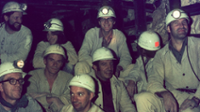News
-
 Wil Roebroeks looks back on a life in archaeology: ‘I’ve always enjoyed my work’09 December 2025
Wil Roebroeks looks back on a life in archaeology: ‘I’ve always enjoyed my work’09 December 2025After nearly two years of retirement, Wil Roebroeks looks back on a career that began in a time of freedom and ended in a field that has undergone pro...
-
 Ice age architecture: how mammoth bones reveal human ingenuity27 November 2025
Ice age architecture: how mammoth bones reveal human ingenuity27 November 2025What do you build with when trees are scarce and winters are brutal? For hunter-gatherers living in current-day Ukraine some 18,000 years ago, the ans...
-
 Early hunter-gatherers reshaped Europe’s ecosystems long before agriculture22 October 2025
Early hunter-gatherers reshaped Europe’s ecosystems long before agriculture22 October 2025In a new study published in PLOS One, Leiden archaeologist Anastasia Nikulina, together with an international team from France, Denmark, the United Ki...
-
 Neanderthals ran ‘fat factories’ 125,000 years ago02 July 2025
Neanderthals ran ‘fat factories’ 125,000 years ago02 July 2025Fat is a very valuable food component, packed with calories, especially important when other resources might be scarce. Our earliest ancestors in Afri...
-
 What does ‘human’ really mean? When Philosophy and archaeology join forces30 June 2025
What does ‘human’ really mean? When Philosophy and archaeology join forces30 June 2025Archaeology is the only science that allows us to study the material traces left by most of human evolution. But what happens when we bring philosophy...
-
 Mediterranean hunter gatherers navigated long-distance sea journeys well before the first farmers24 April 2025
Mediterranean hunter gatherers navigated long-distance sea journeys well before the first farmers24 April 2025Small, remote islands were long thought to have been the last frontiers of pristine natural systems. Humans are not thought to have been able to reach...
-
 The paleo diet: Is it what our ancestors really ate?Video 31 March 2025
The paleo diet: Is it what our ancestors really ate?Video 31 March 2025The paleo diet: eating like people in the Stone Age did, because it is supposed to be healthier. But how accurate are the recipes in this diet? Archae...
-
 Faculty of Archaeology ranks 4th in QS World University Ranking24 March 2025
Faculty of Archaeology ranks 4th in QS World University Ranking24 March 2025It is the ninth year in a row that the Faculty of Archaeology is placed in the top ten of archaeological institutes worldwide. The QS World University...
-
 Archaeology Inter-Section journal offers students the chance to publish: ‘Inter-Section is a great way to get your work in the spotlight’14 November 2024
Archaeology Inter-Section journal offers students the chance to publish: ‘Inter-Section is a great way to get your work in the spotlight’14 November 2024The Faculty of Archaeology's own home-grown journal Inter-Section has released a new volume. Inter-Section offers students and PhD candidates the uniq...
-
 Faculty of Archaeology ranks 5th in QS World University Ranking11 April 2024
Faculty of Archaeology ranks 5th in QS World University Ranking11 April 2024It is the eighth year in a row that the Faculty of Archaeology is placed in the top ten of archaeological institutes worldwide. The QS World Universit...
-
 Looking for the earliest European home with an ERC Consolidator Grant14 February 2024
Looking for the earliest European home with an ERC Consolidator Grant14 February 2024During the Late Pleistocene, Europe was a cold and unforgiving place to live. Even so, groups of early modern humans roamed around, just like their Ne...
-
 Beaver exploitation testifies to prey choice diversity of Middle Pleistocene hominins24 November 2023
Beaver exploitation testifies to prey choice diversity of Middle Pleistocene hominins24 November 2023Exploitation of smaller game is rarely documented before the latest phases of the Pleistocene, which is often taken to imply narrow diets for earlier ...
-
 ‘Media appearances are less scary than you might think’: Researchers share their top tips02 November 2023
‘Media appearances are less scary than you might think’: Researchers share their top tips02 November 2023As a researcher, it can be fun and useful to talk to the media about your work. But on what terms should you agree to do an interview or appear on a t...
-
 Archaeologist Anastasia Nikulina worked on long-term landscape MOOC: ‘Everyone can learn something new from this course’11 September 2023
Archaeologist Anastasia Nikulina worked on long-term landscape MOOC: ‘Everyone can learn something new from this course’11 September 2023As part of the TerraNova project, a European research initiative on the study of landscape histories and futures, a Massive Online Open Course (MOOC) ...
-
 Gerrit Dusseldorp joins Liveable Planet Interdisciplinary Programme: ‘Archaeologists can provide the time-depth perspective’05 July 2023
Gerrit Dusseldorp joins Liveable Planet Interdisciplinary Programme: ‘Archaeologists can provide the time-depth perspective’05 July 2023With the retirement of Wil Roebroeks, Gerrit Dusseldorp will take his place as the archaeological representative in the Liveable Planet Interdisciplin...
